Browse: Page 46
By europolice on 4. Juni 2011
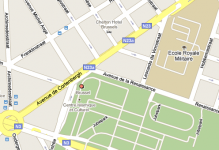 Das Joint Situation Centre
Das Joint Situation Centre
Anfang des Jahres 2010 wurde Haiti von einem gewaltigen Erbeben getroffen und dabei schwer zerstört. Unzählige Menschen starben und der fehlende Zugang zu lebenswichtigen Ressourcen war für viele Menschen in dem Karibikstaat ein existenzielles Problem. Als sicherheitspolitische Vorhut der Europäischen Union landete kurz nach dem Erbeben, am 18.01.2010, ein Team des „EU Joint Situation Center“ (EU SitCen) auf der Insel und begann sofort mit seiner Arbeit (siehe „Operatives Einsatzgebiet des SitCen: Haiti“). Das SitCen (Lagezentrum) ist eine Einrichtung, die, obwohl die EU offiziell nicht über einen Geheimdienst verfügt, wichtige geheimdienstliche Aufgaben auf europäischer Ebene wahrnimmt. Das Lagezentrum arbeitet zudem fernab jeglicher demokratischen Kontrolle, weshalb das Europäische Parlament 2010 eine Studie in Auftrag gab, um zu ermitteln, wie das SitCen besser überwacht werden kann. In der Ausschreibung hieß es, das Lagezentrum habe „das Potenzial, zu einem vollwertigen Geheimdienst zu wachsen“ (Wettach/Krumrey 2010). (weiter auf imi-online.de)
Posted in European Police, Secret Service
By europolice on 31. Mai 2011
 Tatort Flughafen – das Abschieberegime stoppen!
Tatort Flughafen – das Abschieberegime stoppen!
Aufruf zur Demonstration im Terminal 1 des Frankfurter Flughafens
Am Montag, 20. Juni 2011 um 18 Uhr im Bereich B – Abflug
flyer-tatort-flughafen (pdf)
Millionen Urlaubsreisenden gilt das „Tor zur Welt“ als Sprungbrett ins erholsame Vergnügen, Geschäftsleuten dient das Luftverkehrskreuz wie selbstverständlich beim zunehmend globalen Marketing. Für die Grenzpolizei ist der Flughafen vor allem eine EU-Außengrenze, gleichermaßen Kontrollposten und Abschiebeplattform. Dementsprechend erleben Tausende von MigrantInnen und Flüchtlinge schon bei ihrer Ankunft den Airport Rhein-Main als Nadelöhr für rassistische Kontrollen und Internierung oder später als Endstation vor der Abschiebung.
Im täglichen Unrecht der Ausgrenzungen und Abschiebungen am Flughafen spiegelt sich ein modernes Apartheidsystem wieder, das in erster Linie Menschen aus dem globalen Süden ihr Recht auf Bewegungsfreiheit verwehrt. Kapitalismus im 21.Jahrhundert ist ohne globales Lohn- und Ausbeutungsgefälle nicht denkbar. Continue reading „20.6.2011 im Frankfurter Flughafen: Demo gegen Abschiebungen“
Posted in Border Control, Was tun?
By europolice on 31. Mai 2011
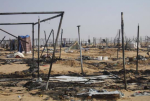 Der Choucha-Appell kann hier online unterzeichnet werden
Der Choucha-Appell kann hier online unterzeichnet werden
“Wir wollen hier weg! Europa muss helfen!“ Die Forderungen auf den Pappschildern der Flüchtlinge und MigrantInnen an der tunesisch-libyschen Grenze sind eindeutig – und zwingend: 5000 Menschen warten seit Wochen und Monaten unter unerträglichen Bedingungen in dem Lager des UN-Flüchtlingskommissariats (UNHCR) in Choucha.
Sie alle konnten dem eskalierenden Bürgerkrieg in Libyen entkommen. Viele waren dort als ArbeitsmigrantInnen beschäftigt, andere hatten Zuflucht vor den Kriegs- und Krisenzonen im subsaharischen Afrika gesucht. Überlebende von gekenterten Flüchtlingsbooten begegnen in Choucha denjenigen, die sich aus Verzweiflung und allen Gefahren zum Trotz wieder Richtung libyscher Grenze auf den Weg machen, um die gefährliche Überfahrt nach Europa zu wagen. Als vier Flüchtlinge aus Eritrea am 21.5. 2011 bei einem Feuer in der improvisierten Zeltstadt sterben, kam es zu spontanen Protesten und Straßenblockaden. Das tunesische Militär reagierte mit Tränengas, Anwohner überfielen das Lager. Mindestens zwei Flüchtlinge wurden erschlagen, viele trugen schwere Verletzungen davon.
Die Flüchtlinge in Choucha hofften und hoffen auf Hilfe und Unterstützung durch den UNHCR, der in den letzten Wochen u.a. die europäischen Staaten mehrfach um die Aufnahme von zumindest 6000 Flüchtlingen aus Libyen gebeten hatte. Vergeblich. Vielmehr wird die europäische Grenzschutzagentur Frontex verstärkt in Stellung gebracht und die neuen demokratischen Regierungen in Nordafrika werden mit Geldangeboten gelockt, damit sie auch in Zukunft die Wachhunde vor Europas Grenzen bleiben.
Die Situation in Choucha muss im Kontext der Vorverlagerung des europäischen Grenzregimes nach Nordafrika gesehen werden. Continue reading „Fluchtwege öffnen, Flüchtlinge aufnehmen!“
Posted in Border Control, Was tun?
By europolice on 30. Mai 2011
Bosco R. Asiimwe
Kigali — Organisations of regional police chiefs in Africa have agreed to carry out joint operations on crime management.
The decision was reached during the Africa Regional Police Chiefs‘ Organisations (RPCO)‘ meeting which ended yesterday in Kigali.
The two-day meeting brought together regional police bodies including; Eastern Africa Police Chiefs Cooperation Organisation (EAPCCO), Central African Police Chiefs Cooperation Organisation (CAPCCO), Southern African Regional Police Chiefs Co-operation Organisation (SARPCCO), West African Police Chiefs Committee (WAPCCO) and Economic Community of West African States (ECOWAS).
It was was held under the theme; „Fight Against The Illicit Accumulation and Trafficking of Firearms and Explosive Materials in Africa“. Continue reading „Africa: Police Chiefs Consider Joint Operations“
Posted in English, European Police
By europolice on 29. Mai 2011
 Jamie Doward and Philippa Stewart
Jamie Doward and Philippa Stewart
Britain is training Saudi Arabia’s national guard – the elite security force deployed during the recent protests in Bahrain – in public order enforcement measures and the use of sniper rifles. The revelation has outraged human rights groups, which point out that the Foreign Office recognises that the kingdom’s human rights record is „a major concern“.
In response to questions made under the Freedom of Information Act, the Ministry of Defence has confirmed that British personnel regularly run courses for the national guard in „weapons, fieldcraft and general military skills training, as well as incident handling, bomb disposal, search, public order and sniper training“. The courses are organised through the British Military Mission to the Saudi Arabian National Guard, an obscure unit that consists of 11 British army personnel under the command of a brigadier. (more on guardian.co.uk)
Posted in English, Militaer
By europolice on 29. Mai 2011
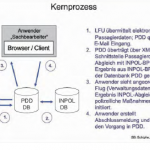 A leaked copy of the latest draft of a proposed “Agreement between the United States of America and the European Union on the use transfer of Passenger Name Record [PNR] data to the United States Department of Homeland Security” has been published by the civil liberties watchdog and investigative reporting group Statewatch.
A leaked copy of the latest draft of a proposed “Agreement between the United States of America and the European Union on the use transfer of Passenger Name Record [PNR] data to the United States Department of Homeland Security” has been published by the civil liberties watchdog and investigative reporting group Statewatch.
The leaked draft “agreement” fails to satisfy the criteria set by the European Parliament for its ratification of such an agreement, including that any PNR agreement should: Continue reading „European Commission wants to immunize DHS collaborators in travel surveillance and control“
Posted in Border Control, Datenbanken, English, Software/ IT
By europolice on 28. Mai 2011
 Can the science of deception detection help to catch terrorists? Sharon Weinberger takes a close look at the evidence for it.
Can the science of deception detection help to catch terrorists? Sharon Weinberger takes a close look at the evidence for it.
Sharon Weinberger
In August 2009, Nicholas George, a 22-year-old student at Pomona College in Claremont, California, was going through a checkpoint at Philadelphia International Airport when he was pulled aside for questioning. As the Transportation Security Administration (TSA) employees searched his hand luggage, they chatted with him about innocuous subjects, such as whether he’d watched a recent game.
Inside George’s bag, however, the screeners found flash cards with Arabic words — he was studying Arabic at Pomona — and a book they considered to be critical of US foreign policy. That led to more questioning, this time by a TSA supervisor, about George’s views on the terrorist attacks on 11 September 2001. Eventually, and seemingly without cause, he was handcuffed by Philadelphia police, detained for four hours, and questioned by Federal Bureau of Investigation agents before being released without charge. Continue reading „Airport security: Intent to deceive?“
Posted in English, Software/ IT
By europolice on 27. Mai 2011
 In early March 2011, Frontex made permanent its land operation „Poseidon“ to patrol the land border between Greece and Turkey over the huge rise in the number of illegal immigrants which crossed into the EU at that spot in 2010. Simultaneously, Frontex announced the expansion of Operation Poseidon to include the Bulgarian-Turkish land border.
In early March 2011, Frontex made permanent its land operation „Poseidon“ to patrol the land border between Greece and Turkey over the huge rise in the number of illegal immigrants which crossed into the EU at that spot in 2010. Simultaneously, Frontex announced the expansion of Operation Poseidon to include the Bulgarian-Turkish land border.
„There are already experts on there ground from Belgium, the Netherlands, Romania, Germany, and Austria working in the Bulgarian Svilengrad border crossing point unit. They are mainly deployed to the Bulgarian border crossing point of Kapitan Andreevo because this is the main point where you detect people trying to use fake ID documents or trying pass hidden inside vehicles,“ Parzyszek told Novinite.com in an interview.
The Frontex Spokesperson has emphasized that, while many different factors influence the influx of illegal migrants into the EU, Bulgaria’s good border control cooperation with Turkey and its investments into border control equipment and the training of border guards provide reasons for optimism that the country can cope with the respective challenges. Continue reading „5 EU Nations Contribute Officers to Frontex Operation at Bulgarian-Turkish Border“
Posted in Border Control, English
By europolice on 27. Mai 2011
 In Weißrussland werden Oppositionelle nach der Auswertung von Telekommunikationsdaten verhaftet. Das Regime von Alexander Lukaschenko, dem letzten Diktator Europas, kann auch auf die Daten der Telekom-Austria-Tochter Velcom zugreifen, berichtet die „Presse“ am Donnerstag.
In Weißrussland werden Oppositionelle nach der Auswertung von Telekommunikationsdaten verhaftet. Das Regime von Alexander Lukaschenko, dem letzten Diktator Europas, kann auch auf die Daten der Telekom-Austria-Tochter Velcom zugreifen, berichtet die „Presse“ am Donnerstag.
Wie alle Netzbetreiber ist Velcom verpflichtet, den Behörden technische Schnittstellen zum Abruf von Daten zur Verfügung zu stellen. Die Konzernmutter in Wien kann durch diesen Umstand einen Zugriff weder dementieren noch bestätigen. Eine aktive Weitergabe von Daten von Regimegegnern oder Demonstrationsteilnehmern schließt Telekom-Sprecherin Elisabeth Mattes aber aus.
In der Vorwoche wurde der Oppositionsführer Andrej Sannikow zu fünf Jahren Straflager verurteilt, weil er Unruhen geschürt haben soll. Im Zuge der Wahlen – Diktator Lukaschenko wurde mit fast 80-prozentiger Mehrheit im Amt bestätigt, es soll zu massiven Unregelmäßigkeiten gekommen sein – haben er und andere Oppositionelle vergangenen Dezember eine Demonstration auf dem Minsker Oktoberplatz organisiert, zu der rund 20.000 Personen kamen.
Etwa 600 bis 700 Aktivisten wurden verhaftet, viele nach der Protestaktion. Die Polizei konnte anhand der Auswertung von Handydaten feststellen, wer auf dem Oktoberplatz gewesen ist. Laut Mattes erfolgt ein allfälliger Zugriff auf Personen- und Rufdaten in Weißrussland ohne richterlichen Beschluss und ohne Involvierung der Mobilfunkbetreiber. (weiter auf unwatched.org)
Posted in European Police, Software/ IT
By europolice on 27. Mai 2011
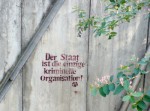 „Straftaten gegen den EU-Haushalt sind Straftaten gegen den europäischen Steuerzahler“, meint Viviane Reding. Die EU-Justizkommissarin sagt Betrügern den Kampf an. Schickt „Eurojust“ bald eigene Ermittler in die EU-Staaten?
„Straftaten gegen den EU-Haushalt sind Straftaten gegen den europäischen Steuerzahler“, meint Viviane Reding. Die EU-Justizkommissarin sagt Betrügern den Kampf an. Schickt „Eurojust“ bald eigene Ermittler in die EU-Staaten?
Die EU-Kommission will die Veruntreuung von EU-Geldern stärker bekämpfen. Hierzu schlug sie am Donnerstag eine Stärkung des Europäischen Amts für Betrugsbekämpfung (OLAF) vor. Geprüft wird auch die Einrichtung einer „Europäischen Staatsanwaltschaft“, die speziell gegen Betrug mit EU-Mitteln vorgeht. Die Justizbehörde Eurojust könnte die Befugnis erhalten, selbst zu ermitteln. Bislang darf die EU-Behörde in Den Haag nur grenzüberschreitende Strafverfahren koordinieren. (weiter auf euractiv.de)
Posted in Justiz
By europolice on 26. Mai 2011
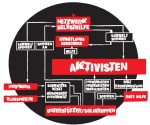 THE G8 IS EVERYWHERE, SO ARE WE !
THE G8 IS EVERYWHERE, SO ARE WE !
Thursday, May 26, the activists occupy Standard & Poor’s
While the financial crisis hits a nearly bancrupt Europe, things have yet to change.
The problem remains the same:
Faced with private financial crisis, the only proposed solution is a policy of public austerity.
It ensures that the cost of economic irresponsibility is assumed by the majority of the population, including the most vulnerable. Globalizing austerity for the people, expanding the playground of multinationals, thus the project of the G8 and G20 could be summarized.
In response to this logic, at the time when the powerful gather at the G8 meeting in Deauville, we decided to occupy the Standard & Poor’s rating agency.
This occupation means to point the finger at what we oppose every day: an economic system and policies that favour multinationals, banks and financial institutions at the expense of the people. Globalizing austerity and wars, causing environmental destruction and creating individualism and the destruction of social ties.
Why do we focus on rating agencies ? Continue reading „Occupation of Standard & Poor’s against the G8“
Posted in English, Was tun?
By europolice on 25. Mai 2011
 Video: http://www.youtube.com/watch?v=G8cDezvagFk
Video: http://www.youtube.com/watch?v=G8cDezvagFk
Die Situation im Flüchtlingslager Choucha an der Grenze zu Libyen ist unübersichtlich: Nachdem in der Nacht zum Sonntag (22. Mai) mindestens vier Eriträer bei einem Feuer ums Leben gekommen sind und am 23. Mai Hunderte Flüchtlinge vor den UNHCR-Büros am Rande der Zeltstadt demonstriert haben, scheint die Situation mittlerweile eskaliert zu sein: Durch Schüsse des tunesischen Militärs (ob mit scharfer Munition oder Tränengas, ist ungeklärt) sind dreißig Personen verletzt worden, davon einige schwer. Vorausgegangen war eine Blockade der Straße zwischen dem Camp und der sieben Kilometer entfernten libyschen Grenze. Zur Eskalation hat wohl auch der Umstand beigetragen, dass die Straße eine wichtige Verbindungsstraße ist und sich daher auch Teile der lokalen Bevölkerung gegen die Flüchtlinge gewandt haben. Continue reading „Tunesien: Proteste im Flüchtlingslager Choucha, 23.5.2011“
Posted in Border Control, Was tun?
By europolice on 25. Mai 2011
 David Woods
David Woods
The National Policing Improvement Agency, working together with the Association of Chief Police Officers, has launched an online training package for police, fire and ambulance personnel across the UK to help prepare them for the challenges of the London 2012 Olympic and Paralympic Games.
The Games will require the largest ever peacetime policing operation, mobilising officers from every force in England, Wales, Northern Ireland and Scotland, in addition to requiring operations by the other emergency services. (more on hrmagazine.co.uk)
Posted in English, Policing Major Events
By europolice on 24. Mai 2011
 No arms for dictators – no nuclear arms
No arms for dictators – no nuclear arms
Amsterdam, May 24– On May 26 the Dutch Campagne tegen Wapenhandel will organise a picket line at the European Aeronautic Defense and Space Company (EADS) shareholders meeting in Amsterdam. EADS is one of the biggest European arms producers. Due to inadequate arms export regulation the company can export its weapons all over the world, also to dictatorships. Moreover the company is a nuclear weapons producer.
EADS produced weapons are sold to all tree parties in the Libyan war. To Khadaffi, to the countries which are presently bombing Khadaffi , and to the rebels. In 2009 EADS participated in the LAVEX arms fair in Tripoli. The cynicism of arms trade needs no further illustration.
The Campagne tegen Wapenhandel believes that no arms should be delivered to dictatorships and regimes which are violating human rights. Continue reading „Protest at shareholders meeting EADS, arms supplier to the Libyan war“
Posted in English, Militaer, Software/ IT, Was tun?
By europolice on 24. Mai 2011
In Amsterdam wurden 60 Grundschulkinder zu besonderen Hilfskräften der Polizei vereidigt. Sie sollen die Polizei in ihren Wohnvierteln unterstützen und zum Beispiel auf Taschendiebe oder Raser aufmerksam machen sowie Müllbeutel an Hundebesitzer verteilen. Diese Vereinnahmung ist abstoßend, meint die Kolumnistin Elsbeth Etty in der Tageszeitung NRC Handelsblad: „Wie positiv, sympathisch und sozial bindend diese Initiative der Amsterdamer Polizei auch präsentiert wird, ich bekomme ein ziemlich unbehagliches Gefühl dabei. Ja, es ist sogar widerlich. Es ist nicht Aufgabe der Obrigkeit, Kinder im Geist der Treue zur Autorität zu erziehen und sie einzusetzen, um die öffentliche Ordnung und Sicherheit zu gewährleisten. Das fängt mit dem Verteilen von Säckchen für Hundekot an. Sind die Kids eigentlich gegen beißende Hunde und aggressive Herrchen versichert? Und läuft das nicht auf eine Art der Indoktrinierung der Kinder zu willigen Dienern der staatlichen Institutionen heraus? Macht aus Kindern keine Polizeispitzel!“. Continue reading „Amsterdamer Polizei indoktriniert Kinder“
Posted in European Police |
By europolice on 23. Mai 2011
Die Unterzeichner dieser Erklärung sind Vertreter der Zivilgesellschaft aus der ganzen Welt, die Freiheiten im Internet, digitale Bürgerrechte und freie Kommunikation fördern wollen.
Unmittelbar vor dem diesjährigen G8-Gipfel in Deauville richtet die französische G8-Präsidentschaft ein G8 Internet-Treffen, das so genannte „e-G8 Forum“ aus. Hier will Frankreich die Agenda des G8-Gipfels hinsichtlich zentraler Internet-Regulierungsfragen formen. Dieses Treffen ist deshalb so wichtig, weil die Rolle des Internets in Gesellschaft und Wirtschaft erstmalig ausdrücklich auf der G8-Agenda steht.
Aufgrund ihrer maßgeblichen Stellung für die Weltpolitik haben die Richtlinien der G8 großen Einfluss auf die globale Internet-Regulierung. Bedauerlicherweise unterwandern und bedrohen einige der derzeit in den Industriestaaten geschaffenen gesetzlichen Rahmenbedingungen das offene und neutrale Internet – und damit genau jene Eigenschaften, die den Wesenskern des demokratischen und wirtschaftlichen Potenzials des Internets ausmachen.
Unserer Meinung nach sollten die G8-Mitglieder das e-G8-Forum als Gelegenheit nutzen, sich öffentlich zu den Zielen zu bekennen, allen Menschen Internetzugang zu ermöglichen, digitale Zensur und Überwachung zu bekämpfen, die Haftung von Internetmittlern in Grenzen zu halten und die Prinzipien der Netzneutralität zu wahren. Continue reading „Erklärung der Zivilgesellschaft an e-G8 und G8“
Posted in Software/ IT, Was tun?
By europolice on 23. Mai 2011
Tausende subsaharische Flüchtlinge und MigrantInnen stecken im Lager Choucha nahe der libyschen Grenze fest – viele fliehen zurück nach Libyen
Choucha ist eines von vier an der offenen tunesisch-libyschen Grenze gelegenen Lagern zwischen Ben Guardane und Ras Jdir. Es wurde vom UNHCR, Rotem Kreuz und Rotem Halbmond am 24.2.11 kurz nach Beginn der Auseinandersetzungen in Libyen errichtet, als überwiegend Ägypter und Bangladeshi ankamen. Dort, in wüstenartigem Gebiet, müssen zur Zeit 4000 bis 5000 subsaharische, ostafrikanische und andere Flüchtlinge aus 30 Nationen in Zelten leben, wenn sie Schutz durch den UNHCR beantragen wollen. Diejenigen, die über Geld und Pässe verfügen, können prinzipiell ins Landesinnere weiterreisen, in der Realität stellt sich dies jedoch aufgrund von tunesischen Polizei- sowie Militärkontrollen als (nahezu) unmöglich dar. Laut UNHCR sind rund 3800 der ZeltstadtbewohnerInnen als Flüchtlinge oder Asylsuchende registriert und der größte Teil lebt bereits seit zwei bis vier Monaten dort. Dieser vom UNHCR-Sprecher als „zweite Vertreibung“ bezeichnete Situation trifft vor allem Flüchtlinge aus Ländern, in die sie nicht zurück können wie Somalia, Sudan, Eritrea, der Elfenbeinküste oder dem Irak. Continue reading „Tunesien: Mehrere Tote bei Brand in der Zeltstadt im Sand“
Posted in Border Control
By europolice on 20. Mai 2011
 Paul Fontaine
Paul Fontaine
Icelandic police have denied they knew that purported environmental activist Mark Stone was actually British policeman Mark Kennedy. One Icelandic MP believes the case should become a foreign affairs matter.
As Grapevine reported, British policeman Mark Kennedy participated in the Kárahnjúkar protests, and told the Guardian that he had taken part in major protest operations, rising up the activist ranks, and had even seduced protesters to extract information from them. Saving Iceland, an environmentalist group who spearheaded the protests against the Kárahnjúkar dam project, denies that Kennedy was particularly active or important in Iceland.
However, the revelation called into question just how much Icelandic police knew about Kennedy’s real identity, and the Ministry of the Interior formally asked police headquarters for answers. RÚV now reports that the National Commissioner of the Icelandic Police says they have no records of Mark Kennedy, and that there is no evidence to suggest that police were aware of Kennedy’s identity. Minister of the Interior Ögmundur Jónasson has been outspoken on the matter, saying that Icelanders should not allow foreign police forces to sneak their way into the country, and that Kennedy’s use of sex as part of his „investigations“ is a violation of international law. Continue reading „Police Deny Knowledge Of Undercover Cop“
Posted in English, European Police
By europolice on 20. Mai 2011
MSF criticizes inconsistent European policies claiming to protect civilians by engaging in a war while closing its borders to them
Paris, May 19, 2011 – Médecins Sans Frontières is publishing an open letter today in 11 newspapers * to the leaders of the States of the European Union involved in the war in Libya.
In the letter, the organization criticizes the European „policy doublespeak“ that claims to be conducting a war to protect civilians while closing its borders to the victims of that same war on the pretext of preventing a massive inflow of illegal immigrants.
„The European States involved in the war in Libya are shirking their obligations, both legal and moral, and are neglecting the victims of the war to which they are a party,“ says Dr Unni Karunakara, International President of MSF. „The words and the actions of our leaders, presented against a backdrop of the battle against illegal immigration, actually restrict the access of the victims of war to Europe. This political cynicism is shameful.“ Continue reading „Europe must accept the boat people fleeing Libya“
Posted in Border Control, English
By europolice on 20. Mai 2011
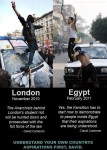 We, students, precarious workers, unemployed, and activists of Europe and North Africa met in Tunis to share our knowledge and begin a process of common struggles. The struggles that have swept across North Africa over the last few months spoke to the entire globe because the absence of a future for the new generations was at the center of these conflicts. The front lines in these struggles were held by the new generation who is always the first to fight and the last to be listened to. In the context of the global economic crisis, there are many parallels in the reasons why we are fighting in Europe and why Ben Ali and Moubarak were toppled.
We, students, precarious workers, unemployed, and activists of Europe and North Africa met in Tunis to share our knowledge and begin a process of common struggles. The struggles that have swept across North Africa over the last few months spoke to the entire globe because the absence of a future for the new generations was at the center of these conflicts. The front lines in these struggles were held by the new generation who is always the first to fight and the last to be listened to. In the context of the global economic crisis, there are many parallels in the reasons why we are fighting in Europe and why Ben Ali and Moubarak were toppled.
These struggles are demanding a radical change of a system based on generalized exploitation by parasitic governments of elites over the needs of the many. We are revolting against the misery of the present and to build new social relationships that are produced by processes of liberation and the reappropriation of our collective wealth. These struggles create common spaces that power constantly tries to fragment and repress. Continue reading „Call for a Transnational Meeting in Tunisia“
Posted in Border Control, English, Was tun? |
 Das Joint Situation Centre
Das Joint Situation Centre












